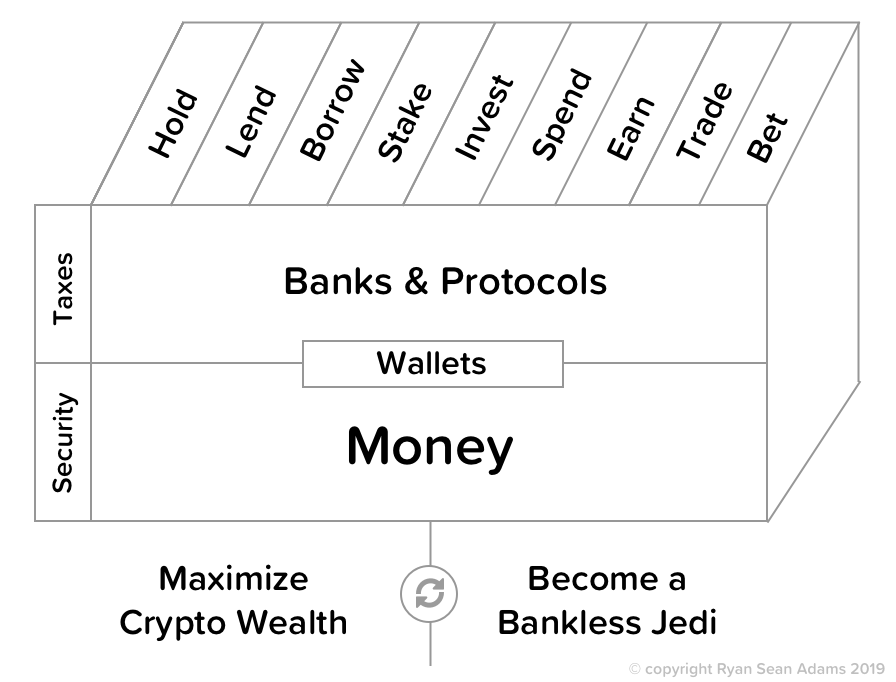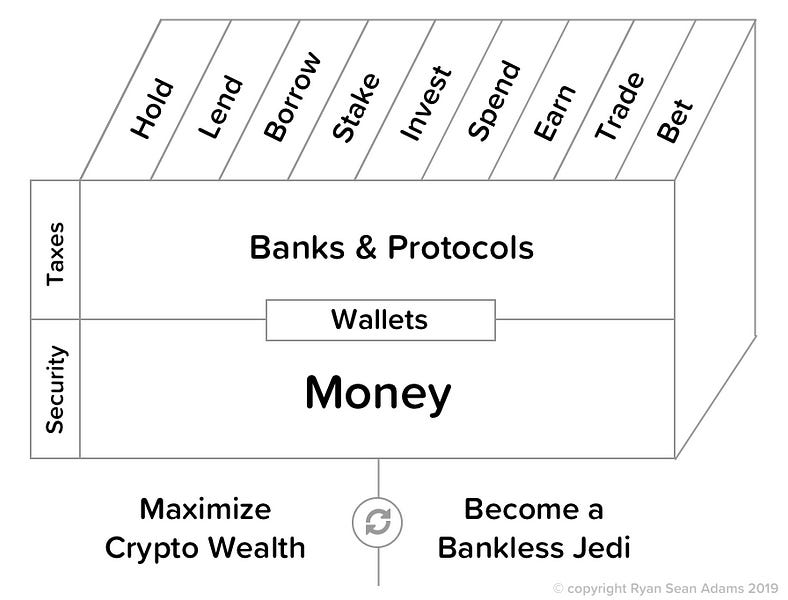Level up your open finance game three times a week. Subscribe to the Bankless program below.
Dear Crypto Natives,
You’re in the Bankless program because you’re passionate about crypto. Maybe you’ve even considered launching a career in the crypto industry? Today we’re going to learn how in just three steps.
One note before we begin. You have to weigh this carefully. Assuming you’re already investing in crypto, then adding the investment of your career in crypto provides a totally new level of risk exposure that you shouldn’t necessarily take.
Depending on crypto for your income can actually reduce your ability to make good crypto investment decisions. Imagine the psychology of watching your portfolio fall off a cliff while simultaneously knowing with each price drop the risk of losing your job has also increased—are you likely to make good investment decisions under that type of pressure?
Earning income from a job with no exposure to crypto while dollar-cost averaging into it is less glamorous but probably underrated if it gives you the confidence to continue buying when you should and if it stops you from selling when you shouldn’t. Crypto is risky enough without removing the safety net of a non-crypto paycheck!
Have I dissuaded you? That’s not my intent. Just weigh it carefully is all and consider de-risking your crypto exposure if you do it. Like leverage a career in crypto can amplify both your risk and reward exposure to this asset class.
The best test—is crypto all you can think about? Are you so passionate about doing something in crypto that your current gig is soul-crushing and you absolutely can’t think of anything else? Are your prepared to stick it out for a multi-year bear market?
Before you get a job in crypto make sure the raw passion is there.
And don’t overexposure yourself to risk.
- RSA
TACTICS TUESDAY:
Tactic #17:
How to get a job in crypto
Guest post by: Rob Paone Founder of Proof of Talent
There are no short-cuts to getting a good job in crypto. You have to put in the work. Fortunately, if crypto is your passion already the work won’t feel like work.
I asked Rob to give actionable advice on how to get started. He’s not only followed these steps himself (see his YouTube and Twitter for evidence) he also works to help crypto companies find talent as his day job. If you’re serious about investing your career in crypto, read then re-read his three fantastic tips.
- Goal: Learn the three best things you can do to get a job in crypto
- Skill: Beginner
- Effort: Spend 5-10 hours a week if you’re serious
- ROI: Career in a fast growing industry—could be like learning the web in the early 90s
How to get a job in crypto
Finding a job in the blockchain and cryptocurrency industry is no easy task, especially for non-engineering job seekers. At the present time, about 65% of the available opportunities within the industry are software engineering related, while the last 35% or so are split between Operations, Marketing, Biz Dev, Legal, Product and Design.
Regardless of your occupation, the following steps are actions that anyone can accomplish to make themselves a more attractive candidate when applying to roles within the industry.
Build Social Proof for your “Personal Brand”
Social Proof is a tactic in the modern marketing world where companies use expert, celebrity or user opinions to build trust in their brand. People often talk about the importance of “personal brand” and while I think the term is overused in cringey ways, the concept of building social proof around your personal brand is immensely helpful when it comes to finding a new job.
The idea around building social proof for your personal brand is especially valuable in the blockchain and cryptocurrency industry, which is still relatively small in comparison to more established industries. At its core, the community is still welcoming of individuals who make positive, unsolicited contributions in earnest (Putting extra emphasis on the positive, unsolicited contributions in earnest!).
So how does one go about building social proof that adds to your personal brand? It comes down to how you can provide the most value to others in the industry in a way that directly correlates with your ambitions for employment.
If you’re a software engineer, the idea is relatively straightforward. Contribute open-source code, technical documentation support, etc to projects you’re passionate about. Love Bitcoin? Work to support the community’s development. Passionate about DeFi? Get cracking within the Ethereum development community.
The concept is a bit less straightforward for nontechnical folks, but still very much possible. Take for example this newsletter. RSA might not be a software engineer, but he’s built up an incredible amount of social proof with Bankless by providing value to a growing audience. He might not be looking for a career change now, but if he ever was, you can sure bet that future employers would find his work impressive.
Whether you share your thoughts on Medium, drop short insights on Twitter, speak to local groups, etc, find ways to bring value to the community and you’ll set yourself up for success in the job search.
Networking
One of the benefits to building social proof for your personal brand is that networking will happen organically. However, it’s important to emphasis the incredible importance of having a network within the industry, especially when searching for a new role.
As previously discussed, the industry is still rather small, which means that even a moderate sized network will open up a vast number of opportunities for you. You’ll significantly increase your chances of getting an interview at a company when you either know someone currently working there, or can receive a referral from someone with a connection at the company.
In the simplest form, there are two ways you can network:
- In-person
- Online
People often ask me, “Which is the best way to network? Online or in-person?” and the best answer? It’s both.
I understand not everyone lives in a location like San Francisco, New York, Singapore, etc, which hold a plethora of Meetups on a weekly basis that one can attend, but if you are located in such a place, I’d certainly make physical meetups a priority.
If you aren’t in a city with a vibrant cryptocurrency community, try to travel to a well-vetted event (always do significant due diligence on crypto events, they can be very hit or miss) if you have the means. I’ve found the ETH Global hackathon events to be a great place for engineers to meet like minded folks and network, but there are plenty of others as well. (RSA: check out EthDenver Feb 14-16)
Regardless of your location though, the blockchain and cryptocurrency is teeming with activity on a near 24/7 basis online. Whether you prefer Twitter, Telegram, Reddit, or Discord, there are numerous subsections of the community in which you can create lasting connections online. (RSA: Try the Inner Circle Discord server)
Online or in-person, the focus should always be on genuine connections.
Focus on Continuing Education
Keeping up with the constant developments of the cryptocurrency world is a full-time job for many people, but it’s important to do your best to continually education yourself. I mention this because I truly believe it is a key differentiator in the interview process for many candidates.
I often ask job seekers about their experiences, knowledge and interests within the industry and the response I get is something like this, “Well, I invested in a few tokens in 2017 but have calmed down a bit since then. However, I think the blockchain is really interested and a total game changer!” Quite frankly, that line of thinking isn’t going to cut it when it comes to the competitiveness of many roles.
Have specific topics you’re interested in that you can speak to. Enthusiasm makes a huge difference!
Are you passionate about DeFi? Be able to articulate what it is about decentralized finance that fascinates you, be able to discuss the projects you think have the greatest chance of success and point to details that show you’re educated on the subject.
Finishing Thoughts
The blockchain and cryptocurrency industry is a very unique place and will likely stay that way for the foreseeable future. With uniqueness comes some quirks, especially when finding meaningful employment in the industry.
The action items I discussed in this edition of Bankless certainly require an extra amount of work for job seekers, but it’s often a necessary step to improve your candidacy.
It’s all about opening as many doors as possible for yourself with the first two steps, building social proof for your personal brand and networking. Once you’ve opened those doors, your emphasis on continued education will help you to seal the deal by showing your superior qualifications
Action steps
- First determine—do you want a job in crypto?
- If you do want a job in crypto: build a brand, start networking, and stay educated
Author Blub
Author's Bio: Rob Paone is the Founder of Proof of Talent, a technical recruiting firm that exclusively services the blockchain and cryptocurrency industry. In this capacity, Rob supports over 15 different companies in their hiring efforts primarily focused in New York, San Francisco, Chicago and Boston.
Subscribe to the Bankless program. $12 per mo. Includes Inner Circle & Deal Sheet.
Filling out the skill cube
Today we learned how to get a job in crypto—a job in the industry can be a good way to level up fast, but it also comes with risk of over exposure to crypto if you’re also already financially invested. Consider leveling up in the skill cube on your own for a while before also investing your career in crypto.

👉Send us a tip for today’s issue (rsa.eth)
Not financial or tax advice. This newsletter is strictly educational and is not investment advice or a solicitation to buy or sell any assets or to make any financial decisions. This newsletter is not tax advice. Talk to your accountant. Do your own research.
Disclosure. From time-to-time I may add links in this newsletter to products I use. I may receive commission if you make a purchase through one of these links. I’ll always disclose when this is the case.
